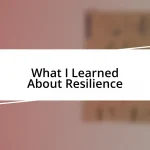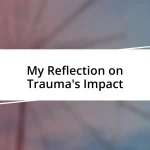Key takeaways:
- Trauma impacts emotional well-being, leading to isolation and distorted perceptions, which can hinder connections with others.
- There are different types of trauma: acute, chronic, complex, and secondary; each affects individuals in unique ways.
- Seeking help through therapy and support groups is vital for healing and developing effective coping strategies.
- Unresolved trauma can result in long-term effects, including heightened anxiety, relationship challenges, and physical health issues.

Understanding trauma’s impact on life
Trauma doesn’t just leave physical scars; it often manifests in the emotional landscape of our daily lives. I remember a friend who would flinch at sudden noises, an echo of past distress. Isn’t it fascinating how a simple sound can trigger such profound memories?
Living with trauma can create a sense of isolation that is difficult to articulate. I once felt completely misunderstood, as if my internal battles were invisible to everyone else. Have you ever felt that way? It’s a heavy burden, one that can distort perceptions and hinder genuine connections with others.
In my experience, trauma impacts decision-making, often leading to fear-driven choices. For instance, I noticed I began to avoid certain situations that reminded me of distressing experiences. It raises the question: how many opportunities do we miss because of the shadows of our past?
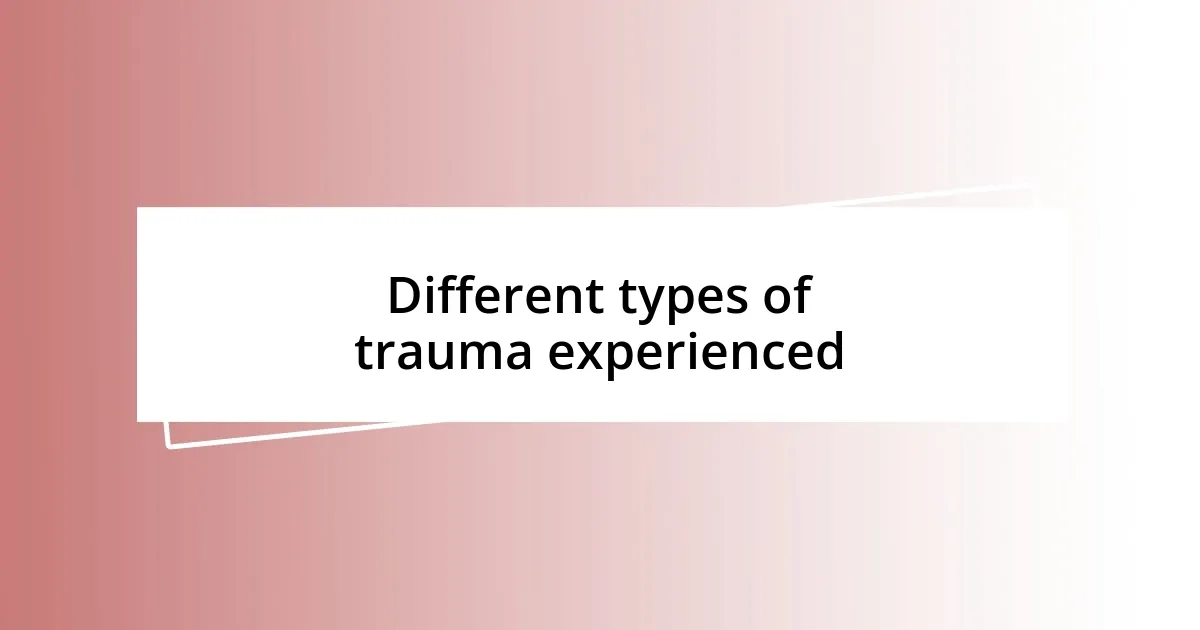
Different types of trauma experienced
Trauma can take many forms, each affecting individuals in unique ways. It’s intriguing to realize how various experiences can lead to similar emotional responses. I remember a colleague who shared her experience with childhood trauma. She had been bullied in school, and even years later, her anxiety flared up in social situations, demonstrating how deeply such experiences can embed themselves in our psyche.
Here are some different types of trauma people may experience:
- Acute Trauma: Resulting from a single incident, like an accident or natural disaster.
- Chronic Trauma: Prolonged or repeated trauma, often stemming from situations like domestic abuse or chronically stressful environments.
- Complex Trauma: Exposure to multiple traumatic events, particularly in childhood, which can complicate emotional responses and coping mechanisms.
- Secondary Trauma: Also known as vicarious trauma; it can occur when someone witnesses or hears about the trauma experienced by another person. This was something I felt when I listened to a loved one recount their struggles—it left an imprint on my emotional state.
Understanding these types reveals the complexity of trauma and the varying paths individuals navigate toward healing. Each person’s story is different, but they all share the common thread of pain and resilience.
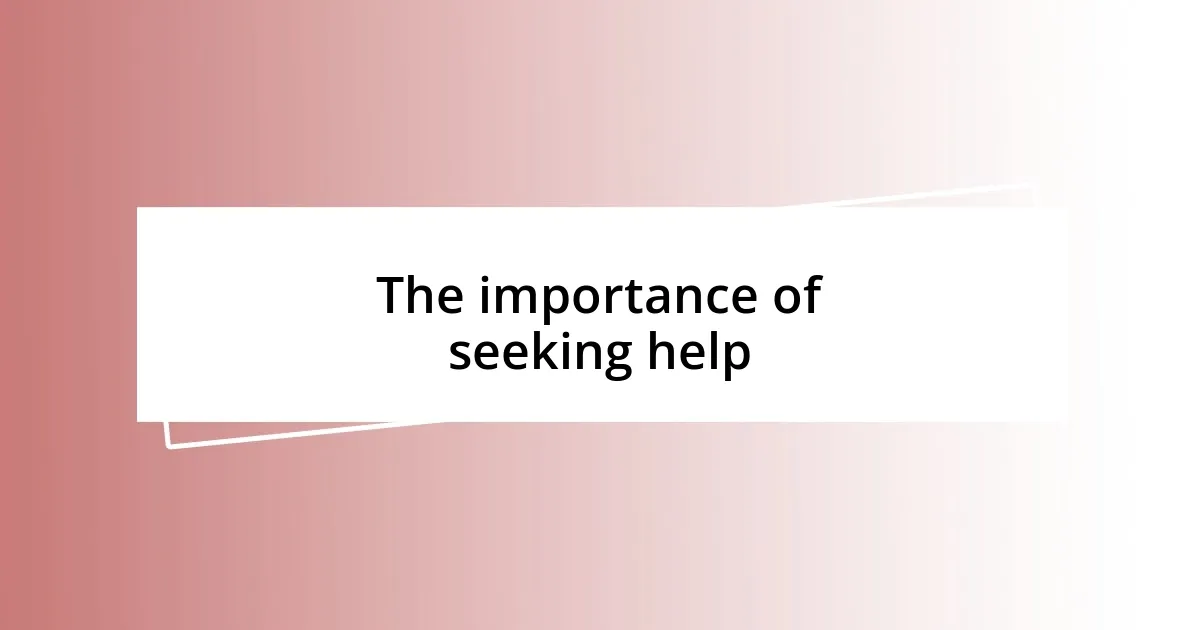
The importance of seeking help
Seeking help is a pivotal step when dealing with trauma. From my experience, reaching out for support was initially daunting. I worried others would judge my vulnerability, yet that act of reaching out became a lifeline. The understanding I received from a therapist was invaluable; it was refreshing to share feelings that had long been bottled up. Have you ever found solace in expressing your struggles to someone who truly listens?
I often reflect on how crucial it is to acknowledge that healing isn’t a solitary journey. When I joined a support group, I realized the power of shared experiences. Hearing others articulate their pain made me feel less isolated. It created a bond of understanding that affirmed my belief: we don’t have to face our shadows alone. Isn’t it remarkable how connection can illuminate our paths to recovery?
The decision to seek help can also significantly influence our coping skills. After working with a counselor, I learned about different strategies to manage anxiety and intrusive thoughts. This toolkit transformed my daily life, allowing me to navigate challenges with newfound resilience. My journey taught me that asking for assistance is not a sign of weakness but a courageous step toward growth and healing.
| Support Options | Benefits |
|---|---|
| Therapy | Personalized approach; Safe space for expression |
| Support Groups | Shared experiences; Sense of community |
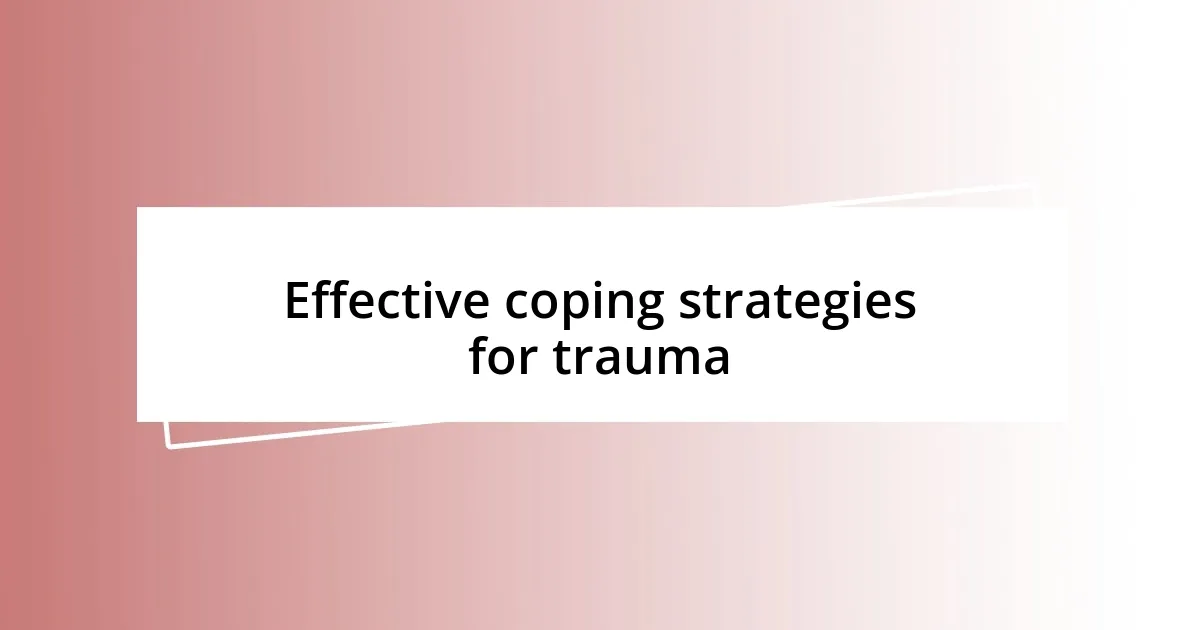
Effective coping strategies for trauma
Coping with trauma isn’t a one-size-fits-all process, but I’ve found that certain strategies can genuinely make a difference. For instance, grounding techniques—like focusing on your breath or the sensations beneath your feet—can pull you back to the present moment during overwhelming times. I remember one particularly anxiety-filled day when I took a few minutes to engage in deep breathing; it was a small act that led to surprisingly profound relief.
Another effective strategy is journaling. Writing down my thoughts and emotions helped me untangle the complex feelings swirling in my mind. I often found that putting pen to paper provided clarity and allowed me to process my experiences more deeply. Have you ever tried writing out your feelings? It can be a brave step toward understanding your own story, and sometimes, seeing your emotions in front of you can be incredibly illuminating.
Additionally, self-care is essential in managing trauma. Simple activities, like going for a walk in nature or soaking in a warm bath, can provide soothing moments amidst chaos. I distinctly remember an afternoon when I chose to disconnect from everything and immerse myself in nature. That little break allowed me to recharge and reconnect with myself. How often do we give ourselves that time? It’s crucial to recognize that prioritizing self-care isn’t indulgent; it’s a vital part of healing that encourages growth and resilience.
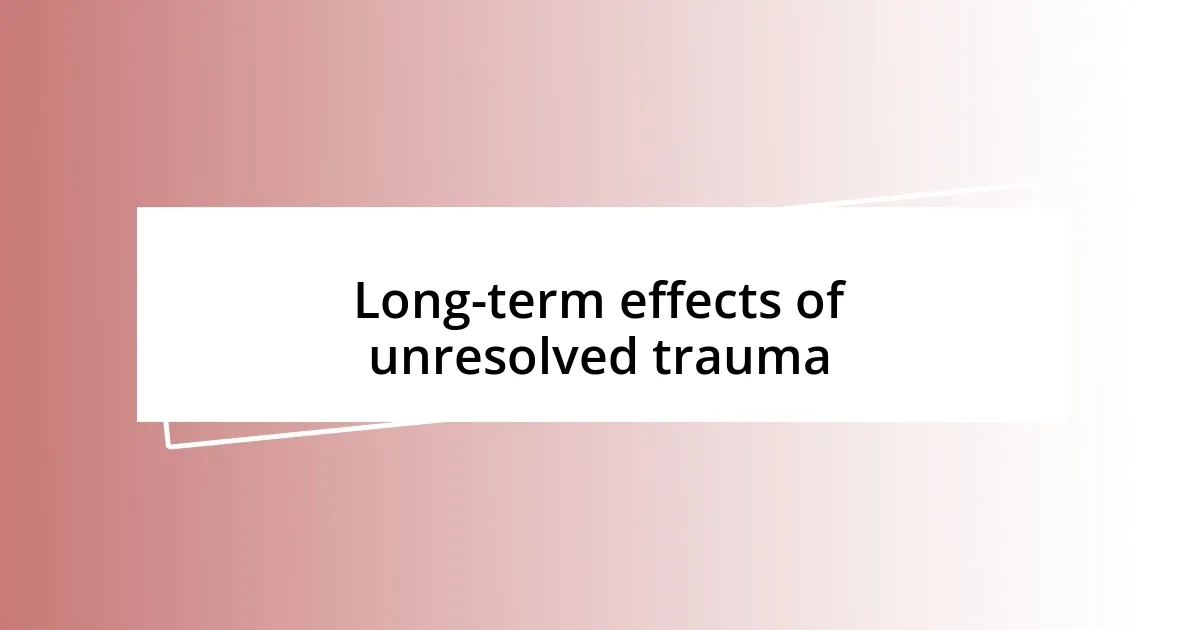
Long-term effects of unresolved trauma
The long-term effects of unresolved trauma can reverberate through various aspects of an individual’s life. Personally, I’ve witnessed how it can manifest as heightened anxiety or a pervasive sense of unease. For instance, there were times I found it challenging to enjoy activities I once loved—like spending time with friends or diving into a good book. Have you ever felt a shadow cast over your joy from experiences that seem like distant memories?
I also realized that unresolved trauma can complicate relationships. I struggled with trust and often second-guessed my interactions, wondering if my past experiences were shaping my perception of others unfairly. Reflecting on this reveals a critical truth: when we don’t address our trauma, it can distort our view of the world, making it tough to connect genuinely with those around us.
Moreover, the effects of unprocessed trauma can also lead to physical health issues. I experienced a notable increase in stress-related symptoms, like headaches and fatigue. It became clear to me that our emotional and physical health are deeply intertwined. Isn’t it fascinating—and a little frightening—that unresolved feelings can manifest in our bodies, echoing our inner turmoil? It’s a reminder of how important it is to confront and heal from our pasts.
